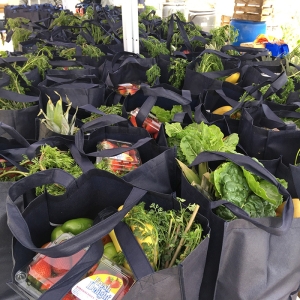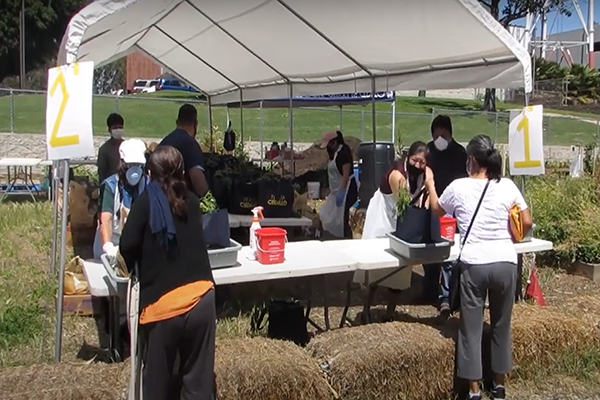Cultivating Community in Downtown Los Angeles
May 01, 2020 / by Jacqueline Mazarella- Alumni
In March 2020, Los Angeles Councilmember Gil Cedillo asked Jose Ruiz, MSW ’17, if he could upscale his community garden to provide 300 Emergency Grab-n-Go food bags each week to respond to the COVID-19 crisis. Ruiz had just last year taken .16 acres of space in the Westlake neighborhood of Downtown Los Angeles and created a farming community.
“I come from a family who farms,” Ruiz said. “Having been raised in that type of setting, for me, it was always personal.” Previously, Ruiz worked in the Central Valley; his father picked peaches and other seasonal fruits. He wanted to help people grow their own food in Los Angeles.
Ruiz started CultvaLA, an organization to develop urban gardens, with the mission to transform access to healthy food through people, social enterprise and environmental justice. He now has three community gardens up and running.
CultivaLA is intergenerational, with the youngest member aged 22 and the oldest 77. The farmers―“cultivadores”―are predominantly Latino, and many have a family history of farming. The spaces are individual farms, and the emphasis is on urban agriculture. These are not typical botanical gardens, they are being used to supplement nutrition.
Empowering a community through enterprise
Covering the costs out of his own pocket, Ruiz began buying fresh produce from Central Market in downtown Los Angeles twice a month to supply bags of food for members of the downtown community in need. To supplement those bags, CultivaLA paid the cultivadores of Westlake Garden for whatever produce grown in their individual plots that they could not use themselves.
For this community farmers market, Ruiz initially approached Jose Felix, a three-time cancer survivor and member of Westlake Garden, to use his garden box as a pilot. Felix is an expert grower, and it was a way to show the other members of the garden that by selling extra Swiss chard he could earn about $12 bi-weekly.
“It's 20 steps from Felix’s box to where we were supplying the farmers market and folks were dying for it,” Ruiz said.
For one or two dollars, members of the downtown community could buy, for example, fresh herbs from cultivadores’ gardens that they could not find anywhere else. CultivaLA was building a strength base, empowering the community through their purchasing power, and also empowering the cultivadores in their enterprise.
“In the bags we have cucumbers, melon, pineapple,” Ruiz said. “The essentials like onions, tomatoes. We’re conscious about what we buy because we want to make sure that people actually eat and use what they’re getting. We’ve been getting a lot of homeless individuals that ask, ‘Can I just get fruit?’ So we’re very conscious about getting fresh pears, apples, bananas for those that may be out on the street.”
CultivaLA built commercial garden boxes, 26x10 and 10x8, where the cultivadores could grow more cilantro, Swiss chard, parsley and celery to add to the bags and help expand the social enterprise. The cultivadores could also choose to grow produce in half of their own garden boxes for themselves, and sell the other half to CultivaLA to be included in the bags for the community.
“We started to expand so it would become self-sustainable, not thinking COVID would happen,” Ruiz said. “We envisioned something long-term: the connection with the land, folks that want to be part of this. It just went to scale overnight.”
All in during the pandemic
When Councilmember Cedillo asked if they could scale it up to 300 bags, Ruiz and his cultivadores jumped to the challenge. The cultivadores help care for and cultivate the commercial garden boxes for the Emergency Grab-n-Go food bags, in addition to tending their own boxes. They also volunteer to assist with the distribution.
Felix has volunteered at all the Grab-n-Go distributions, and Hilda Vasquez, 77, comes to sort the cilantro and help prep the Swiss chard with other members. All the Swiss chard for the Grab-n-Go bags is now grown at Westlake Garden.
“At this point it's no longer a garden activity,” Ruiz said. “We've been asked by the councilmember to step up and do this.”
Ruiz made it clear to the cultivadores that they did not have to participate if they were not comfortable; they would still have access to and water for their individual garden boxes. He did not want them to feel pressured, given increased fear that the elderly were being hit harder by the virus.
“So I told Hilda, I understand if you don't want to do this,” Ruiz said. “And she said, ‘No, I'm all in.’"
CultivaLA is a 501c3 nonprofit organization. Ruiz hopes to receive donations, and is applying for city funding to help cover the cost of the produce, about $2,400 per week to produce 300 bags.
Now that CultivaLA is focused on the COVID-19 emergency operation, they are not selling herbs to the public—for safety, they stopped cash transactions. All areas are sterilized, they adhere to strict six-foot social distancing and other safety procedures are in place. The bags are placed on trays so there is no direct contact with recipients, and the trays are disinfected every 15 minutes.
CultivaLA has also connected with local organizations. WellnestLA, formerly known as Los Angeles Child Guidance Clinic, pays youth in their program to work at the garden to learn agricultural skills. Nearby is a women's shelter, and a sign is posted there for the residents to know when the food bags are available.
“Last week, we had people lining up at nine in the morning,” Ruiz said. “That just tells you of the need.”
The beauty of understanding the plant
Ruiz and the cultivadores understand the process of sustaining the farming.
“We purposefully chose Swiss chard because it's very giving, but it depends how you cut it, how you harvest it, the process and how you water it,” Ruiz said. “This past Thursday we had Jose Felix harvest the Swiss chard, and based on our calculation it will be ready for production again next Thursday.”
One of the cultivadores originally planted cilantro to sell to the farmers market. Now she is donating it for the supply.
Ruiz stressed that this is a new, quickly growing operation. The first week, he forgot to give a bag of produce to each of the volunteers. Now, he prepares extra bags, in addition to the 300 for the community, and sets them aside at the beginning of the day. However, many of the cultivadores refuse those bags, stating they have their own garden boxes. They offer their bags to others in the community who need them.
Ruiz thinks the city is doing a good job managing the complexity of the pandemic, with test sites and resources, but there are still inequities. Westlake and Pico Union are now some of the hardest hit neighborhoods in Los Angeles County of reported COVID-19 cases, based on the Los Angeles Times tracker and recent news headlines.
For agencies who work with seniors, youth and other vulnerable populations, Ruiz hopes they will reach out to CultivaLA and get creative with him in how to provide food bags to these populations and ensure they are fed. CultivaLA has already started providing produce bags to Special Services for Groups SILVER (formerly Older Adults Division), a senior home in Silverlake.
“We are investing in our backyard,” Ruiz said. “This is USC’s backyard. Hopefully we can create more positive change.”
CultivaLA during COVID-19
See what CultivaLA is doing to bring fresh food to the Westlake community in Los Angeles every week during COVID-19.
To reference the work of our faculty online, we ask that you directly quote their work where possible and attribute it to "FACULTY NAME, a professor in the USC Suzanne Dworak-Peck School of Social Work” (LINK: https://dworakpeck.usc.edu)

